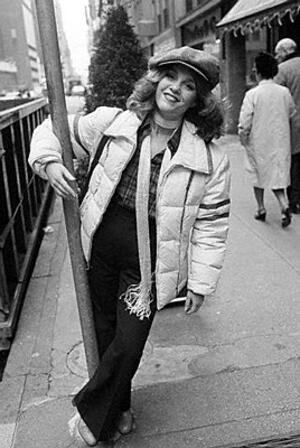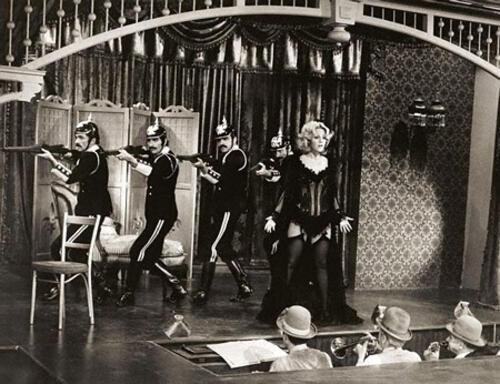Jewish Women in Comedy - Madeline Kahn
A perennial scene-stealer, Madeline Kahn appeared in some of the funniest movies in Hollywood history, leaving a legacy as one of the all-time funny ladies in show business. While primarily achieving fame through her comedic work, Kahn was also an accomplished stage and television actress.
Born September 29, 1942 in Boston, Madeline Gail Kahn was the oldest child of Paula Kahn and Bernard Wolfson. Paula and Bernard were high school sweethearts and Paula gave birth to Madeline when she was only 17 years old. Kahn later recalled her Jewish mother as "a Bohemian—in the good sense of the word. A searcher." This searching was evident in her mother's experiments with a variety of religions throughout Madeline's childhood.
Shortly after his return from World War II, Bernard left the family, and Paula took her daughter to New York so Paula could pursue her dream of being an actress. While her mother worked on her career, Kahn attended boarding school for five years, where she began to act and sing herself.
"[O]ne of the most talented people"
From a young age, Kahn showed great promise as an actor, earning a drama scholarship to Hofstra College. At Hofstra, she continued to hone her craft, although one teacher cautioned her that her baby-talk way of speaking would handicap her career. Far from being a hindrance, Kahn would use this "handicap" to create a series of unique and memorable characters. She graduated from Hofstra in 1964 with a degree in speech therapy.
After graduation, Kahn began to audition for acting parts in New York. Within a year, she had landed a chorus role in the revival of Kiss Me Kate and made her Broadway debut in Leonard Stillman's New Faces of 1968. By 1973, Kahn received her first of four Tony Awards nominations for In the Boom Boom Room. Although she would have over 40 films to her credit, she often returned to the stage in New York, which she continually called home.
Kahn made her film debut in the 1972's What's Up Doc? and in 1973 she earned her first Oscar nomination, in the supporting actress category for her role as Trixie Delight in Paper Moon. But it was in her collaborations with Mel Brooks that Kahn truly achieved her fame.
Appearing as the Marline Dietrich-esque Western saloon singer Lili Von Shtupp in the film Blazing Saddles, Kahn earned her second straight supporting actress Academy nomination in 1974. This was followed the next year by her role as Frankenstein's monster's beau in Young Frankenstein. Kahn would also appear in Brooks's High Anxiety and History of the World Part I. "She is one of the most talented people that ever lived," Brooks once said, "I mean, either in stand-up comedy, or acting or whatever you want, you can't beat Madeline Kahn."
Throughout the 1970s and 1980s, Kahn appeared in a variety of film comedies, including The Adventure of Sherlock Holmes' Smarter Brother, The Muppet Movie, Clue, Betsy's Wedding, and Mixed Nuts. She also lent her voice in An American Tail and A Bug's Life. Though not as successful as her film and stage careers, Kahn also appeared in several television series.
"It's some sort of explosive reaction"
Kahn finally won a Tony Award in 1993 for best actress for her role in Wendy Wasserstein's The Sisters Rosensweig. Kahn played Gorgeous Rosensweig, a character that could have easily devolved into a stereotypical caricature of an affluent, suburban Jewish woman. Critics, however, praised Kahn for her funny, nuanced performance. The role, for Kahn, was also an opportunity to explore Judaism.
Although her mother was Jewish, Kahn was not raised in an observant household; she once said in an interview that her mother "investigated various religions." When Kahn took on the role of Gorgeous, however, her mother proved to be very helpful, finding women in her community who allowed her to videotape their rituals. With wonder, Kahn reflected that "These people observe the Sabbath and enjoy it and were sweet enough to send me the tapes so I could study them. So that is how the Jewish tradition was passed along in our family."
Despite the accolades of critics and peers, Kahn, an intensely private and personal person, often had a hard time overcoming her shyness. While discussing comedic technique before an audience, Kahn remarked, "Laughter is a strange response. I mean, what is it? It's a spasm of some kind! Is that always joy? It's very often discomfort. It's some sort of explosive reaction."
In 1996, Kahn began a three-year stint on the television show Cosby playing Phylicia Rashad's best friend. In September 1998, Kahn was diagnosed with ovarian cancer though she didn't announce her condition until November 1999. She battled the disease for over a year and in October of 1999, she married her longtime companion John Hansbury. Ultimately, however, on December 3, 1999, at the age of 57, she succumbed, like her close friend Gilda Radner, to ovarian cancer. Her last film was the 1999 release, Judy Berlin.
Although she once said that she found "being funny to be very hard work," for over 25 years, Madeline Kahn made audiences laugh in a myriad variety of film, television, and stage roles.





I adore Madeline Kahn, an extraordinary talent, truly gifted. I was disappointed today, 12.30.2023, to catch a recent episode of Harvey Levin's TMZ (recorded 12.28.2023, S17,Ep101) while they were referencing an unrelated story of a young actress, Madeline Cline and her apparent beau SNL's Pete Davidson. Harvey let out a surprise at the notion that PeteD was "seeing Madeline Cline?!".. to which one of the attorneys on the show corrected him, including the proper last name, noting she Ms Kahn passed in 1999 - and the staff, including Harvey, laughed as they switched to a photo of the beautiful Madeline Kahn. Harvey acted as if he didn't know she had passed, (which was out of character for him; he knows the best of the best in the entertainment industry across decades). I was so dissapointed. She'd get the humor, and would be above all that, but it hurt and bothered me. God speed dear lady. You are missed!❤️
Always loved and enjoyed her, smart beautiful and funny. So muchtalent and such a great performer.
I loved and still do. She had a presence that seemed so effortless and being a retired actress myself she always managed to make me laugh. Just like so many talented comedians she is and will continue to be sorely missed.
thanks for your contributions,you will be missed